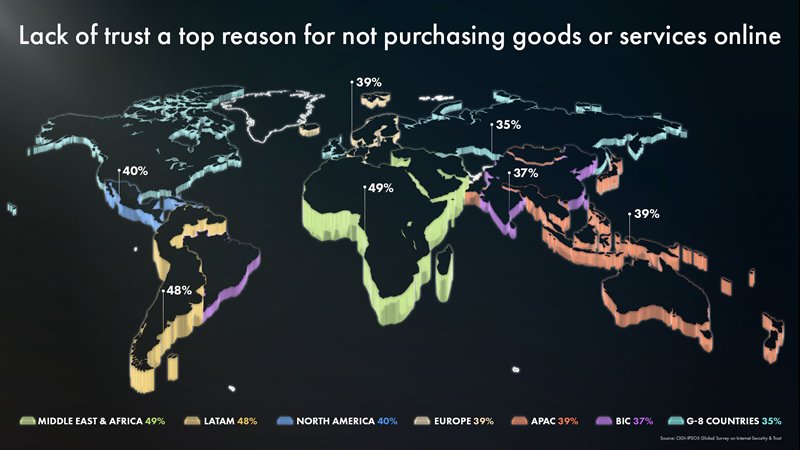A new global survey reveals that Internet users are increasingly concerned about their online privacy, and that 49 percent of users polled say lack of trust is their main reason for not shopping online.
The survey, conducted by Ipsos and the Centre for International Governance Innovation (CIGI), in collaboration with the United Nations Conference on Trade and Development (UNCTAD) and the Internet Society, comes as data breaches and the reported hacking of elections in several European countries continues to capture international headlines. The survey results suggest that the resulting impact on trust is hindering further development of the digital economy.
Released today at the UNCTAD E-Commerce Week in Geneva, the 2017 CIGI-Ipsos Global Survey on Internet Security & Trust shows that among those worried about their privacy, the top sources of concern were cybercriminals (82%), Internet companies (74%) and governments (65%).
“The lifeblood of the Internet is trust, and when that is damaged, the consequences for the digital economy are nearly irreparable,” said Director of CIGI’s Global Security and Politics program Fen Osler Hampson. “The results of this global survey offer a glimpse into why policymakers should be concerned, and why there is a strong link between user trust and the health of e-commerce,” he said.
Lack of trust is most likely to keep people off e-commerce platforms in the Middle East, Africa and Latin America, suggesting that the potential gains of e-commerce are not spread evenly around the globe.
The survey also revealed great differences in e-commerce behavior when it came to how users are purchasing goods online. For example, in China, India and Indonesia, more than 86 percent of respondents expect to make mobile payments on their smartphone in the next year, compared with less than 30 percent in France, Germany and Japan.
Even in the digital world, location still matters. Fifty-five percent of global respondents indicated that they prefer purchasing online goods and services made in their own country.
"The survey confirms the importance of having adequate consumer protection and data protection in place, areas where many developing countries are lagging behind," said Shamika N. Sirimanne, Director of UNCTAD’s Division on Technology and Logistics. “More capacity-building is therefore urgently needed,” she added.
The survey of 24,225 Internet users was conducted by global research company Ipsos, on behalf of the Centre for International Governance Innovation (CIGI) between December 23, 2016, and March 21, 2017. The survey was conducted in 24 countries—Australia, Brazil, Canada, China, Egypt, France, Germany, Hong Kong (China), India, Indonesia, Italy, Japan, Kenya, Mexico, Nigeria, Pakistan, Poland, Republic of Korea, South Africa, Sweden, Tunisia, Turkey, United Kingdom and the United States.
“Nearly 50 percent of Internet users surveyed do not trust the Internet and this lack of trust is affecting the way they use it. The findings of this year’s CIGI-Ipsos survey underscore the importance of taking action now to build stronger online trust by addressing users’ concerns and using technologies such as encryption to secure communications,” said Sally Wentworth, Vice President of Global Policy for the Internet Society.

